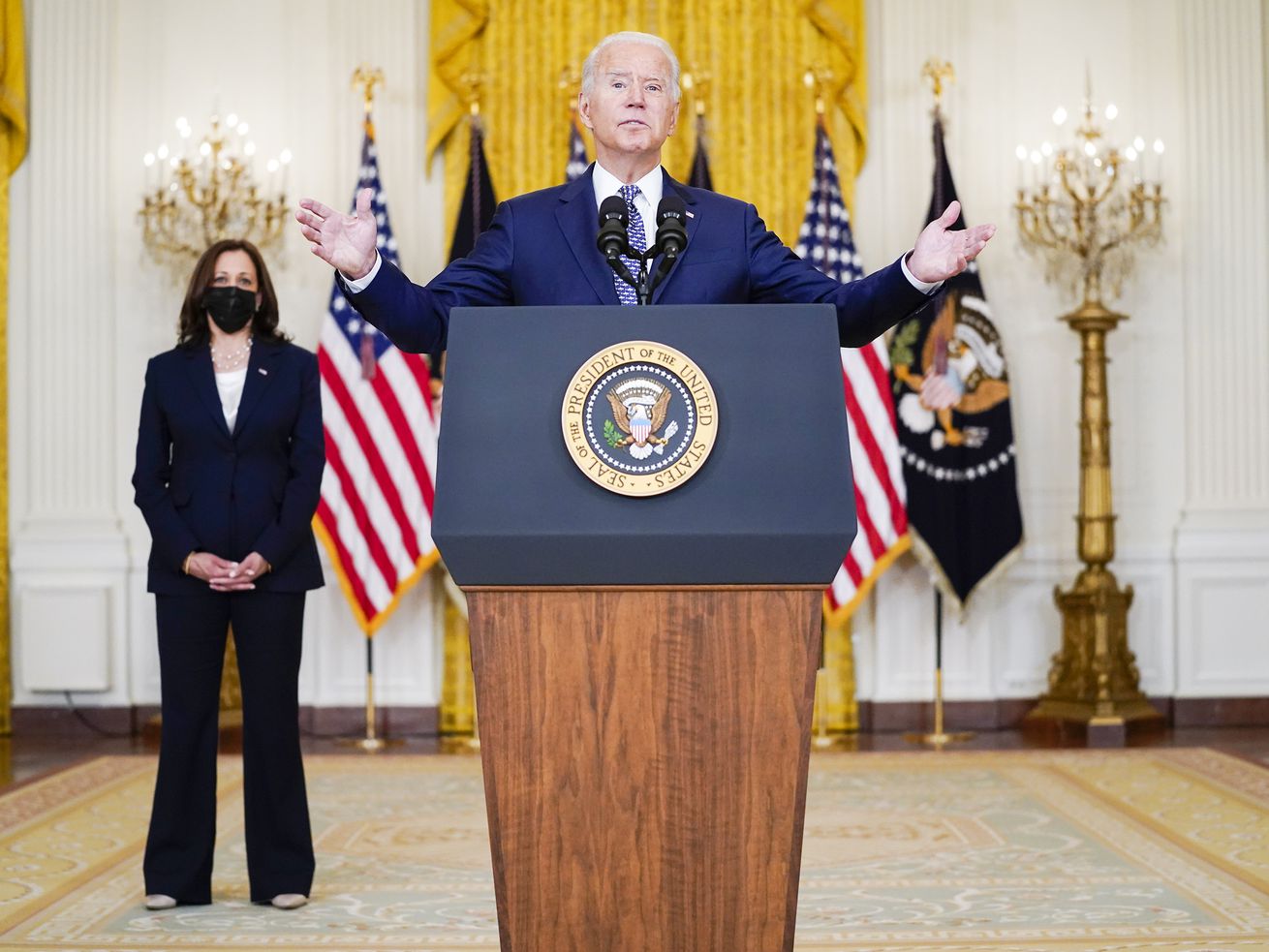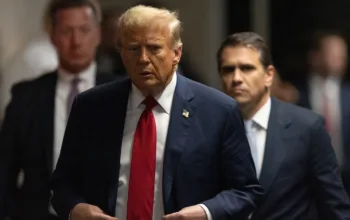A lot could still go awry, but the Senate made some important progress this week.
Earlier this summer, Democrats announced that they’d be taking a circuitous route in their efforts to pass major new funding for infrastructure, something they’ve dubbed the “two-track” plan.
Effectively, they planned to do two things in parallel: work to advance a bipartisan infrastructure bill containing provisions Republicans and Democrats agreed on (like money for roads and bridges), and use a special budget reconciliation process to pass the priorities with only Democratic support, such as the extension of the child tax credit and a payment program intended to incentivize the use of clean energy.
It was a pretty risky approach given how many things could have gone wrong, from moderate Democrats derailing the process over concerns about spending to Republicans refusing to vote for a bipartisan precursor to a partisan measure.
So far, however, the Senate has managed to keep things moving on both tracks, a sign that this approach could wind up working after all. Doing so has been a tenuous balancing act — one that required Democrats to cut the size of their ambitions on more traditional infrastructure, and for Republicans to accept adding about $250 billion to the federal deficit over a decade.
Those compromises, the result of weeks of negotiations, led to notable progress in the Senate this week: Lawmakers voted 69-30 to approve a $1.2 trillion bipartisan proposal that includes funding for roads, bridges, transit, and water infrastructure. Additionally, Democrats passed a $3.5 trillion budget resolution — a blueprint for a reconciliation bill — that includes extensive caregiving provisions and climate policies.
These victories are the product of a couple of factors that came together on infrastructure, an issue that’s long seen strong bipartisan backing from both voters and lawmakers. It’s clear some Republicans saw the bipartisan bill as a concrete win they could point to with constituents, and opted to support rather than obstruct the legislation as a result. Democrats also managed to placate moderates like Sens. Joe Manchin (D-WV) and Kyrsten Sinema (D-AZ) by spending time on a bipartisan measure, ultimately earning their support for the more partisan reconciliation resolution as well.
/cdn.vox-cdn.com/uploads/chorus_asset/file/22774705/GettyImages_1234592644_copy.jpg) Brendan Smialowski/AFP via Getty Images
Brendan Smialowski/AFP via Getty Images“If you’re a Republican, you want to prove that you’re not just here to completely block and stop the entire agenda,” Sen. John Thune (R-SD), a top Senate Republican, told the Los Angeles Times’s Eli Stokols and Jen Haberkorn. “It’d be good, maybe, for the administration, and they probably need a win right about now, but I also think that there are benefits politically to members on both sides.”
There’s still a lot that could go awry before either of these bills becomes law: Both chambers need to write the $3.5 trillion budget bill, and the House needs to consider both measures. In the House and Senate, next steps on reconciliation in particular are set to be tumultuous, with Democratic progressives and moderates expected to engage in significant debate over which provisions make it into the bill.
But the Senate votes this week mark a key, and somewhat surprising, step forward.
Patience, public pressure, and luck has meant infrastructure negotiations have gone well for Democrats so far
In July, Senate Majority Leader Chuck Schumer explained that his plan was to hold votes on the bipartisan bill and a budget resolution before the Senate left for its annual recess in mid-August. On both counts, the upper chamber was able to move things forward, important progress given how much uncertainty there was regarding both tracks.
Republicans and Democrats announced a bipartisan agreement last week, which includes $550 billion in new spending and $1.2 trillion overall allocated to what lawmakers are calling “hard” infrastructure. This agreement is the result of weeks of negotiations between a bipartisan group of roughly 10 senators including Rob Portman (R-OH), Joe Manchin (D-WV), Susan Collins (R-ME), and Kyrsten Sinema (D-AZ). The effort has also gotten a boost from President Joe Biden, who’s among the most vocal champions of bipartisanship and who played a pivotal role in pushing this effort.
Biden’s statements on the legislation were crucial to advancing it. When the president met with lawmakers in June, he pledged that he wouldn’t push to include any physical infrastructure funding in Democrats’ reconciliation bill that wasn’t included in the bipartisan one.
As Politico’s Burgess Everett and Marianne LeVine reported, that position helped assuage some of the Republican senators’ concerns that Democrats would agree to whatever cuts were needed to gain GOP support before later passing everything that was cut using the reconciliation process, which requires only a Senate majority. Taking Biden at his word that what was cut from the bill was gone forever allowed many Republicans to give the bipartisan bill their support, according to Sen. Mitt Romney (R-UT).
In the end, 19 Republicans including Senate Minority Leader Mitch McConnell voted for the bipartisan bill, a rare indication of GOP support in a typically polarized upper chamber. Although there has been bipartisan passage of some less prominent bills like updates to the Paycheck Protection Program and legislation to condemn anti-Asian hate crimes, Democrats previously passed their larger pandemic stimulus package, the American Rescue Plan, along party lines. Republican support on other issues such as gun control and voting rights has also failed to emerge.
Unlike those measures, the infrastructure package had some other things working in its favor beyond Biden’s influence, including that it has long been a chief goal of lawmakers on both sides of the aisle — and that the polling around it shows solid support.
/cdn.vox-cdn.com/uploads/chorus_asset/file/22774713/GettyImages_1333409277_copy.jpg) Win McNamee/Getty Images
Win McNamee/Getty ImagesIn a July AP/NORC poll, for instance, 59 percent of Americans (including 50 percent of Republicans and 69 percent of Democrats) cited infrastructure as a top priority for policymakers to address. When it came to funding roads, bridges, and ports, specifically, 83 percent of all those polled said they supported this, including 79 percent of Republicans and 87 percent of Democrats.
“The fact of the matter is the American public, including the vast majority of Republicans, are very supportive of this,” said Sen. Kevin Cramer (R-ND), a Republican who backed the bill, in a Fox News interview.
The bipartisan package also brings funding for projects to every state. This will allow both Democratic and Republican incumbents to point to specific investments it would bring their constituents on everything from broadband to public transit. And as Thune alluded to in his comments to the Los Angeles Times, some Republicans are using this bill to demonstrate that they aren’t only capable of obstruction.
There may be other calculations at play as well: New York magazine’s Jonathan Chait has theorized, for instance, that the decision to back the infrastructure bill is a way for Republicans to defuse some of the arguments about eliminating the filibuster, since it shows that major legislation is still able to get through with bipartisan support. Republicans — currently in the minority of the Senate — have passionately backed the rule, which requires 60 senators to pass legislation if it gets blocked, while many Democrats had argued for getting rid of it, claiming that Republicans would never work with Democrats on any key priorities.
All that said, Republican backing is not expected to emerge on other, more contentious issues like protecting voting rights or immigration reform. In some ways, the bipartisan appeal of infrastructure is unique: “Advisers say [McConnell] … views it as less ideological than other Democratic priorities,” Politico’s Everett and LeVine previously reported.
It’s also important to remember that the two-track strategy wasn’t just meant to keep Republicans happy: It was created to keep Democrats together, too.
Previously, Manchin had said he wouldn’t consider a unilateral Democratic bill on infrastructure without trying for a bipartisan option. Following the efforts on the bipartisan bill, he later noted that he would be open to including other provisions via reconciliation. In essence, Democrats were able to maintain unity, in part because of the two-track strategy. (For Democrats in swing states, this legislation could also be useful when it comes to the 2022 midterms, when it could help them appeal to more moderate and independent voters.)
Democrats also view budget reconciliation as a way to address additional priorities, since anything passed in this way won’t need any Republican votes. Although there were some key cuts to physical infrastructure that lawmakers had to accept, this two-track approach has enabled Democrats to champion bipartisanship while simultaneously pursuing more ambitious ideas.
Early Wednesday morning, Democrats advanced the $3.5 trillion budget resolution with a 50-49 vote. As Vox’s Andrew Prokop has reported, that measure includes a sweeping expansion of the social safety net including funding for pre-K, two years of free community college, and paid family and medical leave.
For the two-track strategy to succeed, Democrats need to find ways to keep their caucus together
It’s still too early to declare the two-track strategy a total success, however, because neither the bipartisan deal nor the budget is yet law. And Democrats are facing an immediate challenge: determining which provisions will go in the final budget reconciliation bill.
The first hurdle is that only provisions that affect the national budget can be passed via reconciliation. There is some flexibility on what counts as affecting the budget — opening up oil drilling in the Arctic National Wildlife Refuge has previously made the cut — but ultimately, what can and can’t be included in the bill will depend on the judgment of the Senate parliamentarian.
That means some Democratic priorities — such as immigration-related tenets that would establish a pathway to citizenship for some undocumented immigrants — may not be allowed. Previously, for instance, the parliamentarian had ruled that a $15 minimum wage could not be passed via budget reconciliation.
The second problem is that provisions that make it past the parliamentarian will then have to get the approval of the full Democratic caucus in the Senate as well as the support of the majority of House members, which is expected to be difficult. Moderates have been clear they want a narrower package and progressives want a more generous one. Sinema and Manchin have already voiced opposition to the $3.5 trillion figure in the bill, and it’s still unclear how expansive Manchin is willing to go for environmental provisions. Difficult compromises like those made to get the bipartisan deal together may be necessary.
/cdn.vox-cdn.com/uploads/chorus_asset/file/22774734/AP21175615808275_copy.jpg) Jacquelyn Martin/AP
Jacquelyn Martin/AP“I have also made clear that while I will support beginning this process, I do not support a bill that costs $3.5 trillion — and in the coming months, I will work in good faith to develop this legislation with my colleagues and the administration to strengthen Arizona’s economy and help Arizona’s everyday families get ahead,” Sinema previously said in a statement. That was echoed by Manchin on Wednesday, who said in a statement that he had “serious concerns” about the cost of the bill, adding, “I firmly believe that continuing to spend at irresponsible levels puts at risk our nation’s ability to respond to the unforeseen crises our country could face.”
The third issue is timing. After the budget reconciliation bill is passed by the Senate, the House will vote on both the bipartisan bill and the budget measure. Progressives are urging Speaker Nancy Pelosi to make sure that votes on the two measures remain tied together in order to put pressure on moderates to back both, while more moderate members have called on the lower chamber to take up the bipartisan bill first since it’s already done. Lawmakers won’t have pulled off the two-track infrastructure plan until the House has also approved both bills and sent them to Biden’s desk.
As such, the Senate’s progress on both fronts is notable, but far from the endpoint that will make these policies reality.
Update, August 11, 12 pm: This story has been updated with Sen. Joe Manchin’s statement that he has “serious concerns” that a $3.5 trillion budget bill would be too expensive.
Author: Li Zhou
Read More



